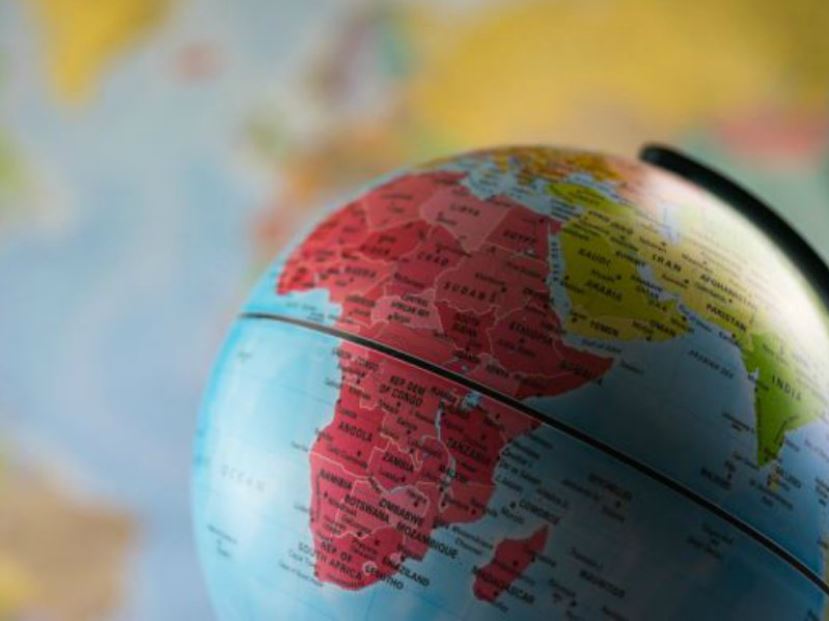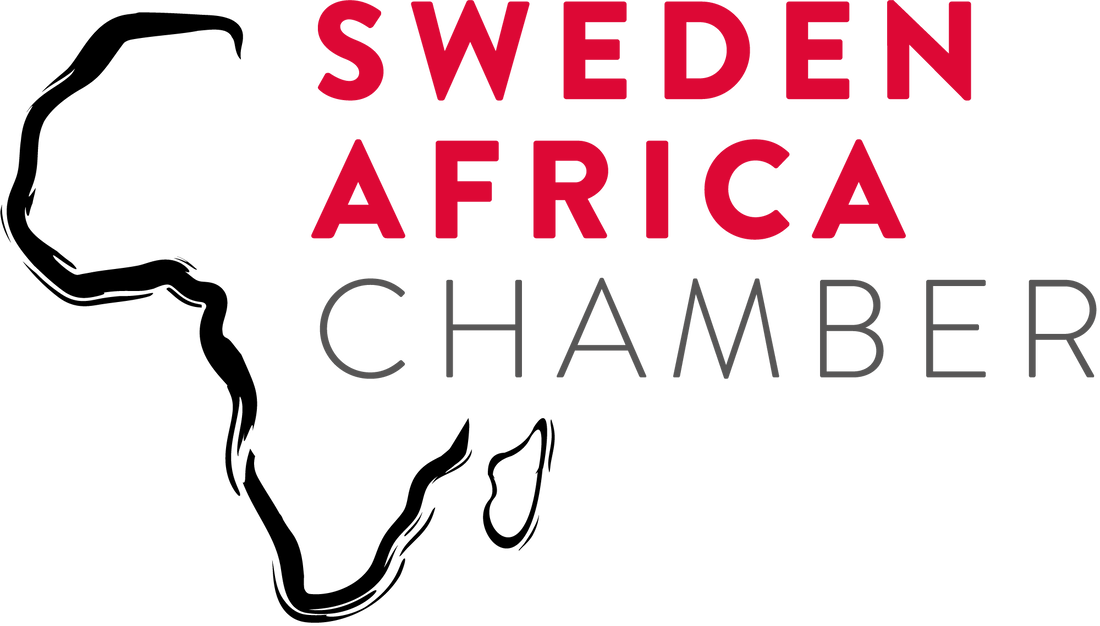Den mesta tiden vid Siemens har Håkansson arbetat från företagets kontor i Finspång, men 2016 flyttade hon till Thailand för en position som landansvarig där. Från och med i höstas är hon så baserad i marockanska Casablanca.
Hon tillstår att Afrika som marknad kan vara krävande och att projekten inte alltid utvecklas i så rask takt. Detta kan påverka vilka som kan våga gå in på marknaden – och vilka som är kunder. - Det bygger ofta på att det är stora och framgångsrika bolag bakom, som har en ganska stabil ekonomi. Men i många fall handlar det också om statliga verksamheter. Till exempel i Moçambique är vår kund staten.Håkansson pekar dock också på att länderna på kontinenten är sinsemellan mycket olika, med väsentligt olika utvecklingsnivåer. Siemens deltog även i Sweden Africa Chambers delegationsresa till Rwanda hösten 2019. Nadja Håkansson upplevde att handelskammaren kunde hjälpa till i stor utsträckning med sitt stora nätverk och långa erfarenhet, och att de öppnade dörrar för de deltagande företagen. - Jag uppskattade verkligen resan till Rwanda. Det gjorde att jag ganska snabbt och effektivt kunde bygga ett nätverk, kunde förstå potentiella kunder och hur marknaden ser ut där – men också hur de andra svenska företagen verkade i Rwanda.Inte minst i de länder där Siemens ännu inte har en stark etablering kan en svensk handelskammare hjälpa till istället, och skapa kontakter och vägar in till samhälle och näringsliv. Under coronakrisen har Siemens, liksom många andra företag, fått uppleva inställda investeringar och frysta projekt, men åtskilliga andra projekt fortsätter trots allt som förut. Dock tycker Nadja Håkansson att krisen framför allt har visat på vikten av att man som företag har en lokal verksamhet på de platser där man verkar. - För om vi har utrustning som kommer från Sverige så har situationen tidigare byggt på att vi skickar följdserviceingenjörer från Europa – medan corona visar att vi måste bygga upp lokal kompetens i regionen.I Siemens fall gäller det exempelvis att föra över en del av kompetensen kring turbiner till mindre utvecklade länder där företaget redan har en verksamhet och där det finns god potential. JOAKIM RÅDSTRÖM Covid-19 has put a lot of strain on economies and populations all over the world, and Africa is no exception. At a new webinar Sweden Africa Chamber highlighted some of the challenges this has put on the continent - but also gave advice on how to pursue business in spite of the difficulties. Moderator Åsa Jarskog, president of Sweden Africa Chamber, opened up by asking how we could carry out and finance larger projects in Africa during the corona pandemic. One way forward is to run projects as large-scale PPP's, or Public Private Partnerships. The first speaker Beatrice Flora Ikilai elaborated on this from her role as Co-President of the newly formed Africa PPP Network (AP3N).
AP3N is a network of PPP units and practitioners across Africa, and has regional representation in North, East, West, Central and Southern Africa. It was originally established to address some of the continent's pressing infrastructure development needs, by discussing financing solutions and joint project setups. - Africa has an infrastructure gap of between 130 and 160 billion dollars, said Ikilai, who has also worked extensively with PPP's at the Ministry of Finance in Uganda. Ikilai pointed to some of the assessments by global institutions and expert bodies, projecting negative growth outlooks for Africa from -1,6 % down to -5,1 %. The situation is exacerbated by that many of the African countries' governments have exhausted their borrowing capacity, that not enough taxes are coming in and that donor countries are also battling corona at home. However, the crisis also offers opportunities for new and strengthened development initiatives. Beatrice Ikilai suggested that foreign investors specifically look to e.g. healthcare infrastructure and services, ICT development and agro-processing. - But you need to go in and do a different kind of risk management framework for projects under covid-19. And of course this is an opportunity for investors from outside, said Ikilai. The next speaker was Alan Sproule, Executive Director Project Finance with Standard Chartered Bank - which, told Sproule, "has been in many African countries for over 100 years". The bank has also been voted the "Best Global Export Finance Bank" by the Global Trade Review. Sproule concurred with Ikilai in her statements about the economic difficulties that the African governments face under covid-19, including obstacles to further borrowing and to financing of much-needed infrastructure projects across the continent. At the same time, 44 billion dollars is anticipated in debt relief for the continent in 2020 alone. A heavy debt burden is however not new for Africa. To address this, whether during the corona pandemic or in normal times, Sproule and others have found PPP's to be a promising solution. - PPP's are a risk-sharing mechanism. What it does is that it allows governments to borrow off balance sheet, so it frees up certain capacities. But it does create contingent liabilities for governments, so it is not a "magic bullet". Nevertheless, it is at least something that the government doesn't have to budget for at an annual basis, said Sproule. User-paid toll roads and bridges, ports and terminals and even railroads, are all examples of projects that work well under PPP financing, as do availability-based power generation and transmission projects. Internal rate of return on African PPP's are typically between 15 and 18 percent. - African governments has also done a lot of work: the environment is investor-friendly, there is certainty about contracts and there are project finance structures that allow sufficient liquidity to come in to be able to finance these projects, added Alan Sproule. The final speakers were Kjell Forsberg, Deputy Director Large Corporates, and Johan Dahl, Country Policy Advisor, both with the Swedish Export Credit Agency (EKN). Kjell Forsberg begun by explaining how EKN had a good year in 2019, issuing guarantees to some 54,2 billion SEK and carrying out transactions in 140 countries. - What happened now with covid-19 was that we had to introduce a few new products to cope with the situation, but what we also realized was that we have the same number of transactions as we normally do. And that is also good, because it means that the underlying export is actually happening, explained Kjell Forsberg. The new products that Forsberg talked about include improved access to working capital credits for small and medium-sized enterprises, a new working capital credit guarantee for large companies (otherwise not allowed since it would be seen as state aid), and a guarantee for short-term credits to high-income countries (which normally the market should handle). Especially the guarantee for large companies has turned out to be in high demand. - We launched it on a Monday, we had the first application at our desk on Tuesday, and we had the first approval one week later. We now have 60 applications within this, totalling more than 180 billion Swedish kronor - and that's only since basically the 23rd of March, said Kjell Forsberg. EKN now also offers services in retail, shipping and tourism, apart from the traditional export sectors. Forsberg's presentation was followed by a deep-dive into the African region by Johan Dahl, EKN, who pointed out a number of countries where EKN has recently downgraded the risk ratings and where EKN's services are in high demand. Downgraded countries include Angola, in category 7, and South Africa, in category 5. - But I would like to stress that even if the risks are high, we will rather downgrade and keep open for cover than close entirely for guarantees, said Johan Dahl. Dahl summoned up by informing that EKN also has a facility for limited guarantees in very difficult countries, to a slightly higher premium. Sweden Africa Chamber arranged a business mission to Rwanda in 2019, and in June this year some of the learnings and experiences were followed up with a webinar on business opportunities in Rwanda. The economy of fast-growing Rwanda is expected to take off rapidly once the corona pandemic has receded - We had a very successful business mission, and there were several results that came after. Soon after several deals were signed, and everything looked perfect. Then as you know what happened is that in February and March borders were closed and the whole world went on lockdown, except for Sweden, said moderator Åsa Jarskog, president of Sweden Africa Chamber, at the webinar.
Jarskog also pointed to the frustration of the chamber’s members when they can't be in touch with their business partners the way they used to be. She however added that the Sweden Africa Chamber is trying to bridge this temporary gap, so that everybody can stay in touch with partners in Africa. At the same time several countries in Africa have reacted swiftly to the threat of the virus. This goes certainly for Rwanda, with its well-structured administration and government strategies. - When the first case was registered here the government was well prepared and acted very fast. The government also had a clear strategy to contain the virus and prevent spreading, so there was a total lockdown for six weeks, said Anne Höglund, acting head of mission of Sweden to Kigali, Rwanda. Thanks to this strategy only 113 cases of corona had been registered in Rwanda up until the time of the webinar. - But even if Rwanda hasn't been hit very hard by the virus itself, the economy has suffered immensely. So to maintain financial stability, Rwanda has received loans from IMF and the World Bank. The government has also launched a response strategy to save the economy, and is working very closely with the international community to finance this. But of course it is very important with private investments and continued business relations. Höglund concluded by stating how the situation arguably has changed with the virus, it is important to remember that what was attractive with Rwanda and very positive before covid-19 has not changed. - So Rwanda is a safe country with high ambitions and a very clear strategy for its development. And Rwanda wants to engage with the world and continue to develop its country. Digitalisation, sustainable solutions and innovation are more important than ever. After Ms. Höglund Philip Lucky, Senior Investment Promotion Officer at the Rwanda Development Board, held a presentation on the economic environment in the country. For instance, GDP has grown with almost 8 percent per annum in ten years, reaching a GDP per capita of USD 787 (or 3,8 times the GDP in 2002). - After the genocide in 1994, the socioeconomic fabric in this country was completely decimated. Today we are the second fastest growing economy in Africa, and the most improved nation in human development in the world. A number of factors have worked together to create today's successful Rwanda, including a low debt ratio, a stable currency, far-reaching efforts to facilitate business, impressive government transparency and a high IT readiness. - We have passed numerous reforms to make Rwanda more attractive for foreign direct investments. For example, the World Bank Ease of Doing Business Report has ranked Rwanda as the second easiest place to do business in Africa, said Philip Lucky. In addition Rwanda has zero percent import duty, no restrictions on foreign ownership and free repatriation of local investment income, capital and assets. - And our climate change policy that was adopted in June 2019 has among the key objectives to promote a green economic transformation, explained Lucky. In terms of opportunities for Swedish investors specifically, Philip Lucky suggests several interesting areas, such as e-mobility, off-grid electricity, forest management and wood processing, and sustainable packaging. Within e-mobility, companies such as Volkswagen, Ampersand and SAFI has chosen Rwanda for their pilot projects, whereas for instance Ignite, Bboxx and Mobisol are very active in the vibrant solar home energy market in Rwanda. After this, Mr. Theoneste Ntagengerwa with the Private Sector Federation of Rwanda, held a presentation on the opportunities and challenges for doing business in Rwanda. - One of the biggest challenges we are currently facing relates to transport and logistics, since most of our exports to Europe and other areas used to go with commercial airlines, but they are not operating now, told Mr. Ntagengerwa. To address some of the difficulties now faced - including the transport and logistics hurdles - the Private Sector Federation of Rwanda has engaged in a number of deep-dive research initiatives in different sectors. Also participating in the webinar was the Ambassador of Rwanda to Sweden, Christine Nkulikiyinka, who explained how Rwanda currently works together with a number of other countries in the region to counteract the corona threat. - And when you look at the support we get from the institutions it is a strong sign that we are reliable as a country, Ms. Nkulikiyinka added with reference to Ms. Anne Höglund's introductory presentation. |
Archives
December 2023
|

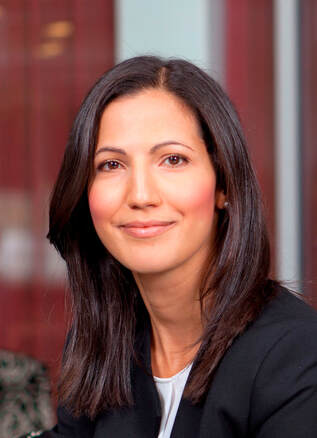
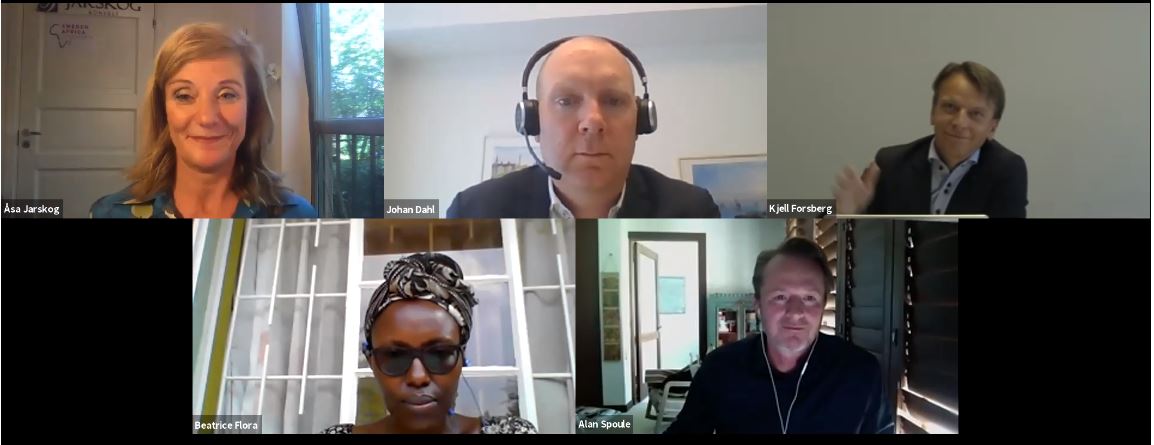
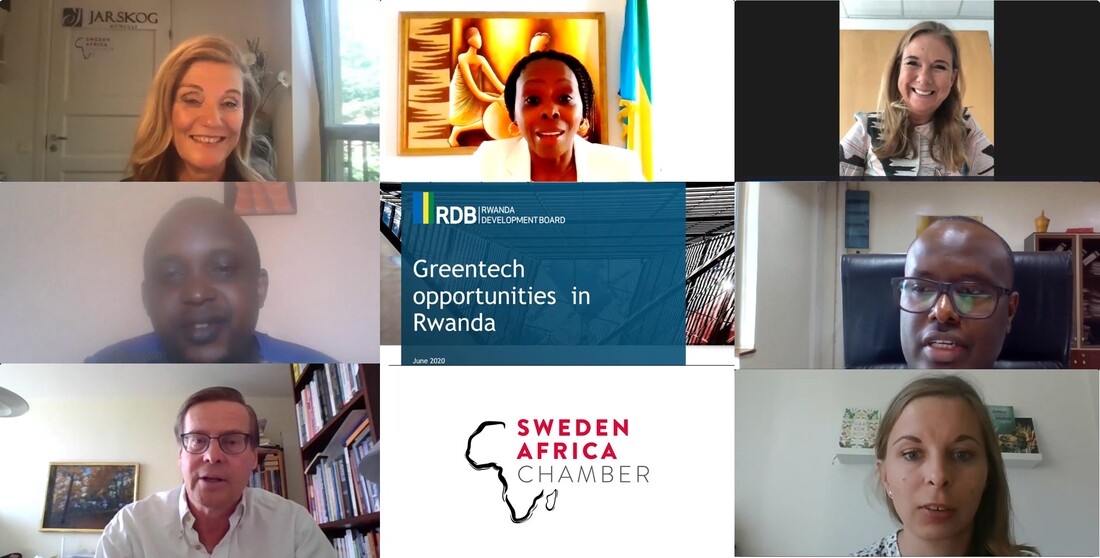
 RSS Feed
RSS Feed
